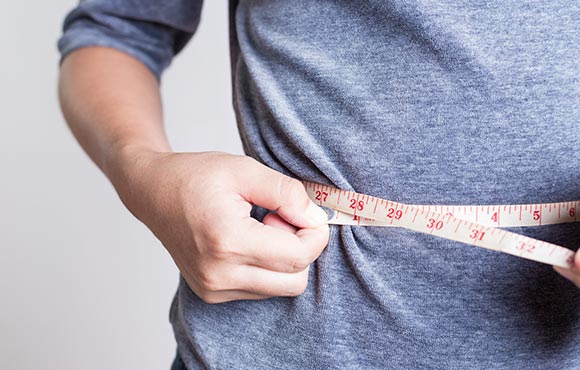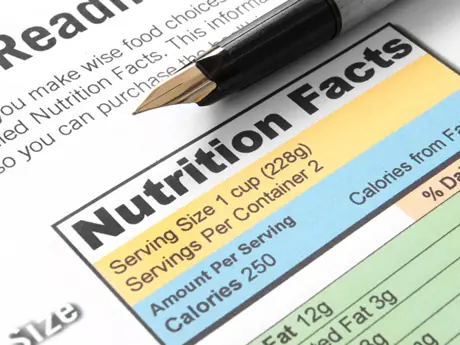BMR Calculator
Have you ever watched a teenager devour a towering double bacon cheeseburger, a plate full of fries, and a tall chocolate milkshake and wondered, "How do you eat like that and not gain weight?" Maybe you've started to notice that your pants have been feeling a bit snug around the waist, even though you're still eating the same healthy diet and following the same exercise routine of years past.
The answer, or at least a good explanation for this, is rooted in what's known as Basal Metabolic Rate, or BMR. BMR is responsible for approximately 60-70% of the total calories you burn each day.(1) It plays a key role in determining whether the body burns that double bacon cheeseburger for energy or stores it as fat.
Understanding your BMR may help you determine how best to eat for your body type, and using a BMR calculator is an easy way to find this number.
But better yet, understanding what a BMR calculator is actually measuring and knowing how to change your BMR might get you one step closer to your fitness goals.
Body Fat
Body Mass Index
Caloric Needs & BMR
Nutritional Needs
Ideal Weight
Heart Rate
Running Pace
These calculations are based on averages and are provided by Welltech Solutions. This Calculator is intended to by used by healthy, non-pregnant adults 19 and older. Athletes may require a higher caloric intake to maintain their current weight.
Basal Metabolic Rate, known as BMR, is the rate at which the body expends energy to maintain essential life functions while at complete rest. The majority of these essential functions continue mostly unnoticed—things like the heart beating, the lungs inhaling and exhaling air, the kidneys filtering waste, new cell creation, maintaining proper body temperature, and more. A BMR calculator measures the sum of kilocalories required to maintain these essential body functions. On average, this sum is approximately 60-70% of a person's total daily energy expenditure.
Because BMR measures these activities while at complete rest, a true calculation of BMR can only be done after a 12-hour fast and a good night's rest and in the absence of any physical activity or emotional excitement, as these factors can temporarily influence metabolic rate.
Factors that Affect BMR
Many factors affect BMR. Most notable are age, body shape, body composition, and hormones. Children and adolescents generally have a very high BMR because their bodies are in a constant state of growth, which requires a constant supply of food in order to gain energy. Remember that cheeseburger, fries, and milkshake that ‘magically disappears’ when a teenager eats it? This is why. As we age, our BMR slows as our body shifts from an anabolic (building) state to a catabolic (breaking-down) state.
Individuals with higher lean body mass—meaning more muscle—have a higher BMR than those without, as muscle requires significant energy to be maintained. Those with high body fat have a much lower BMR because fatty tissue requires very little energy to be maintained. For this reason, men tend to have higher BMR than women based on average body composition. (2)
The hormone thyroxine, produced in the thyroid, directly impacts BMR. Individuals with normal to elevated thyroxine levels (as found in hyperthyroidism) experience higher BMR than those with reduced thyroxine levels (as found in hypothyroidism).
Other factors affecting Basal Metabolic Rate include the total surface area of the body (higher surface area requires higher BMR to maintain body temperature), the presence of a fever or other physical stressors (which can raise BMR), fasting or starvation (both reduce BMR), smoking and caffeine (both increase BMR), sleep (reduces BMR), and emotional stress (increases BMR).
How to Calculate BMR
While you can calculate an estimated BMR using a BMR calculator (which utilizes the following formulas or accepted variations), calculations are only estimates. Your actual BMR is affected by many factors, as stated above.
- Men: BMR = 88.362 + (13.397 x weight in kg) + (4.799 x height in cm) - (5.677 x age in years)
- Women: BMR = 447.593 + (9.247 x weight in kg) + (3.098 x height in cm) - (4.330 x age in years)
Resting Metabolic Rate, or RMR, is the rate at which the body expends energy to maintain essential life functions while at rest, but can include the act of digestion or recent physical activity.(3) RMR measurements will be slightly higher than BMR measurements.
Total Metabolic Rate, or TMR, is the cumulative energy required to maintain essential life functions as well as all physical activity, everything from grocery shopping to a strenuous workout. Even slight increases in muscle activity can significantly raise the metabolic rate during exercise and several hours after.(4)
FAQs
What is a good BMR for my age?
Because so many factors can affect your BMR—age, height, weight, body composition, hormones, stress levels, nutrition, caffeine intake, and more—it is difficult to set acceptable guidelines or standards for BMR measurements. On average, BMR decreases almost linearly with age due to changes in hormones and loss of lean muscle mass as strenuous physical activity tends to decline with age.(5)
In order to offset or "fight back" against this decline in BMR, you must maintain healthy lean muscle mass. In other words, muscle is the key. While cardio exercise is good for your heart, it will not raise your BMR.(6) Instead, incorporate regular strength training into your routine to build and maintain muscle mass.
Are online BMR calculators accurate?
Online BMR calculators provide a fairly accurate measure of BMR. While these BMR calculators do not include factors such as stress level, caffeine intake, nutrition, or hormone levels, they utilize measurable factors and basic BMR calculations to properly measure actual BMR. If you require an exact measurement, many doctor's offices, nutrition professionals, and even gyms can run tests using a special calorimetry device.
Do I need to know my BMR to lose weight?
While it is not necessary to know your Basal Metabolic Rate to lose weight, it may be helpful. And knowing your TMR (total metabolic rate) is an even more helpful tool, as TMR measures the total kilocalories that your body burns on a daily basis. Remember that weight loss is not as simple as creating a calorie deficit, as many believe. Other factors, like hormones, can significantly affect your weight loss (or weight gain) goals.(7)

References
- Cleveland Clinic. (2021, August 30). Metabolism: What It Is, How It Works and Disorders. Cleveland Clinic.
- Buchholz, A. C., Rafii, M., & Pencharz, P. B. (2001). Is resting metabolic rate different between men and women? British Journal of Nutrition, 86(6), 641–646.
- Contributors, W. E. (n.d.-a). Differences Between BMR and RMR. WebMD. Retrieved December 5, 2022, from: https://www.webmd.com/fitness-exercise/difference-between-bmr-and-rmr
- Contributors, W. E. (n.d.-b). What Is Metabolism? WebMD. Retrieved December 5, 2022, from: https://www.google.com/url?q=https://www.webmd.com/fitness-exercise/what-is-metabolism
- H, S., & F, K. (1993, July 1). [Aging, Basal Metabolic Rate, and Nutrition]. Nihon Ronen Igakkai Zasshi. Japanese Journal of Geriatrics. https://pubmed.ncbi.nlm.nih.gov/8361073/
- Johns Hopkins Medicine. (2019). 7 Heart Benefits of Exercise. John Hopkins Medicine.
- Schwarz, N. A., Rigby, B. R., La Bounty, P., Shelmadine, B., & Bowden, R. G. (2011). A Review of Weight Control Strategies and Their Effects on the Regulation of Hormonal Balance. Journal of Nutrition and Metabolism, 2011.







